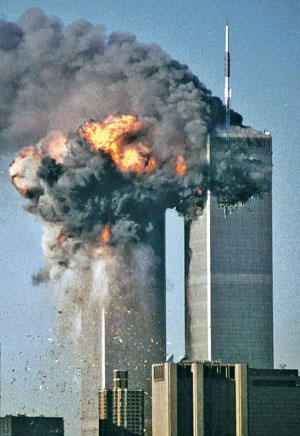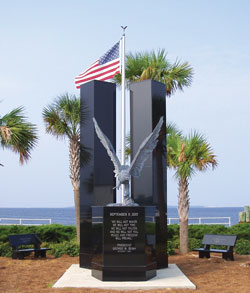9/11: Six Years Later
Today marks the sixth anniversary of the terrorist attack on the
World Trade Centre Twin Towers in New York. Here we reproduce several
articles on 9/11: Six Years Later from the regional press in the USA.
Americans will forget 9/11 at their peril
Cal Thomas
 Throughout our young history, Americans have been admonished to
''Remember the Alamo,'' ''Remember the Maine'' and ''Remember Pearl
Harbour.'' These remembrances - and others - were for the purpose of
motivating the public to fight on until an enemy was vanquished. When
victory was assured, the memory faded into history. Throughout our young history, Americans have been admonished to
''Remember the Alamo,'' ''Remember the Maine'' and ''Remember Pearl
Harbour.'' These remembrances - and others - were for the purpose of
motivating the public to fight on until an enemy was vanquished. When
victory was assured, the memory faded into history.
Now, as we approach the sixth anniversary of Sept. 11, there are
suggestions that we should begin to forget the worst terrorist incident
in America's history. Recently, a front-page story in The New York Times
suggested it is becoming too much of a burden to remember the attack,
that nothing new can be said about it and that, perhaps, Sept. 11
''fatigue'' may be setting in.
Charlene Correia, a nursing supervisor from Acushnet, Mass., is
quoted as saying, ''I may sound callous, but doesn't grieving have a
shelf life? We're very sorry and mournful that people died, but there
are living people.
Let's wind it down.'' Yes, Sept. 11 forces us to be serious, not only
about those who died and why they died at the hands of religious
fanatics, but also so that we won't forget that it could very well
happen again and many of today's living might end up as yesterday's
dead. That is the purpose of remembering Sept. 11, not to engage in
perpetual mourning. The war goes on and to be reminded of Sept.
11 serves as the ultimate protection against forgetfulness.
Images of the Twin Towers is used on jihadist Websites for the
purpose of recruiting new ''martyrs.'' What's the matter with some
people? Does remembering not only Sept. 11 but the stakes in this world
war interfere too much with our pursuit of money, things and pleasure?
Serious times require serious thought and serious action. In our
frivolous times, full of trivialities and irrelevancies, to be serious
is to abandon self-indulgence for survival, entertainment for the
stiffened spine.
''Few Americans give much thought anymore on Dec. 7 that Pearl
Harbour was attacked,'' says the "Times" writer, who goes on to mention
Nov. 22, 1963 (the date of JFK's assassination), the Kent State
shootings on May 4, 1970, and the Oklahoma City bombing on April 19,
1995.
The difference between those tragic events and Sept. 11 is that
Kennedy's assassin, Lee Harvey Oswald, is dead, as is Timothy McVeigh,
and the Vietnam War ended long ago. While all of the Sept. 11 hijackers
died, their ideological and religious colleagues are plotting new
attacks in a war that is far from over.
''Why didn't we see 9/11 coming?'' was a question frequently asked in
the aftermath of that terrorist attack. And the answer should be,
because we forgot the attacks preceding that one, or brushed them off as
inconsequential aberrations so we could get back to watching the stock
market go up and obsess about Bill Clinton's pants coming down.
By not remembering those earlier attacks, the reasons behind them and
the intentions of the terrorists and those who trained and incited them,
we put ourselves in further jeopardy.
Sept. 11 should not be remembered for maudlin, ghoulish and certainly
not for nostalgic reasons. Unlike those other mostly forgotten or no
longer observed dates, this one is key to defending ourselves from a
future attack and further disasters.
Not to remember Sept. 11, is to forget what brought it about. That
can lead to a lowering of our guard and a false sense of security, the
conditions that existed immediately prior to that awful day six years
ago.
Indiana University history professor John Bodnar is asked in the
Times story what might happen on Sept. 11 a hundred years from now. He
replies, ''It's conceivable that it could be virtually forgotten.'' It
might be forgotten - or relegated to a ''Jeopardy'' answer - but only if
we win the war against Islamofascism. If we don't, Sept. 11 will stand
as a day of infamy with consequences to humanity far worse than Dec. 7,
1941.
Salt Lake Tribune
########################
Our View: What we learned from 9/11
 Any democracy serious about the well-being of its people should
re-examine how well its government works regularly. Perhaps Sept. 11
each year is a good time to do that. Any democracy serious about the well-being of its people should
re-examine how well its government works regularly. Perhaps Sept. 11
each year is a good time to do that.
The attacks of Sept. 11, 2001 showed the flaws in our system of
national security, most obviously. But with the help of the bipartisan
9/11 Commission we came to see many more flaws in a variety of
institutions that made us vulnerable to those attacks.
We saw flaws in the communication between our intelligence agencies;
we saw flaws in our diplomatic efforts overseas; we saw flaws in our
system of airline security, and we saw flaws in our ability to correct
those problems in airline security even though the Government
Accountability Office had pointed out those flaws years before 2001.
We came to realise shortcomings in our ability to rally world support
around our cause. That came in reaction to our willingness to reject the
solutions of our friends at the United Nations.
We didn't wait for the U.N. to sanction Saddam Hussein. Clearly, we
did away with an evil dictator faster than the United Nations could or
would have. But we also paid a cost that put more of the death toll on
American soldiers because members of the United Nations were unwilling
to put more of their own soldiers on the front lines.
What we learned from that is somewhat unclear. But it's heartening to
see that Washington seems to be working more closely with the U.N. to
rein in Iran and North Korea. Working with the U.N. on North Korea's
nuclear threat is working, by and large.
The jury is still out on whether it will work with Iran.
American business learned quickly some lessons about how the
terrorist attacks and our attack on Iraq disrupted world oil markets.
It became all too clear that the lifeblood of some American
industries could be cutoff with a series of incendiary explosive devices
made by rogue militias in the streets of Baghdad. We learned to build an
alternative fuels industry, with the help of government subsidies, that
continues to reduce some of the risk of volatile world oil markets.
Clearly, Sept. 11, 2001 magnified the power of the forces of evil in
the world. It should also highlight the need for the United States to
gather democracy-minded friends around the world, or even friends who
are not so democracy minded just yet, to come together in defense of
innocent people under attack from those motivated not by justice but by
jihad.
To that end, we've made progress. Last week Congress approved a 10
percent increase in U.S. foreign aid to $34 billion, a figure $700
million less than President Bush requested, and a figure many
international experts say is still too small given it is usually less
than 1 or 2 percent of the entire U.S. budget. The bill also allocated
some $500 million in educational aid aimed at mostly Muslim countries.
The lesson here becomes it is cheaper to help our friends around the
globe by offering humanitarian aid than military aid. When human beings
have the basics of daily living, they can more seriously consider the
complex and costly system of democracy.
Six years after the wake-up call of Sept. 11, we're back in the race
to bring peace and democracy to those in the world who desire it, but
we're still a long way from the finish line.
The Free Press, Minnesota
##########################
A turning point in history
Leesha Faulkner
History takes only seconds to make but, say those who teach it, years
to understand. Witness great events that affected so many generations:
the bombing of Pearl Harbour, the murders of John Kennedy, Martin Luther
King Jr. and Robert Kennedy and, most recently, the attacks on Sept. 11,
2001.
On that day, now just known as 9/11, terrorists took over passenger
planes and slammed them into buildings in New York and Washington and
into a field in Pennsylvania. Six years later, we still don't understand
the historical context.
On many campuses, college professors teach the catastrophe that
killed 256 people on four planes and 2,725 people on the ground at the
Twin Towers in New York and the Pentagon in a variety of ways. And, they
teach it as part of something larger, not as a single historic event.
That's because it takes the passage of time, analysis and
availability of documents to dissect an event, write about it and
consider it, said historian Elizabeth Payne of the University of
Mississippi.
It may take years before historians find clarity about 9/11. Some of
the questions: In what context did this event play out? What
international political pressure led up to this?
Did this event give birth to a new patriotism in the U.S.? What is
the overall historical theme of 9/11? The beginnings of the Cold War,
which marked the struggle between U.S. democracy and Soviet communism,
is one example of a historic event that has reached sufficient age to
provide fertile ground for academic research.
Several schools of thought exist about the Cold War's origins. The
traditionalists, who were there and helped form policy during the 1960s,
wrote about it from the perspective that the Soviets were responsible
for the breakdown in relationships and that it was necessary for the
U.S. to contain the spread of communism.
The revisionists of the late 1970s primarily saw the U.S.'s push to
become a world cop and the U.S.'s untrustworthy behaviour during World
War II as a primary cause of the tensions with the Soviets.
The latest school of thought emerged during the 1980s and 1990s from
the post-revisionists - a consensus-type perspective that blamed actions
and miscommunications on both sides for the Cold World tensions.
There's a name for this history of writing history: historiography.
Payne points to a lack of historiography of the 9/11 terrorist attacks
as one reason it's not taught per se in college or in university
classrooms by many professors. This isn't a bad thing; it's just how
history is written.
Northeast Mississippi Daily Journal |

